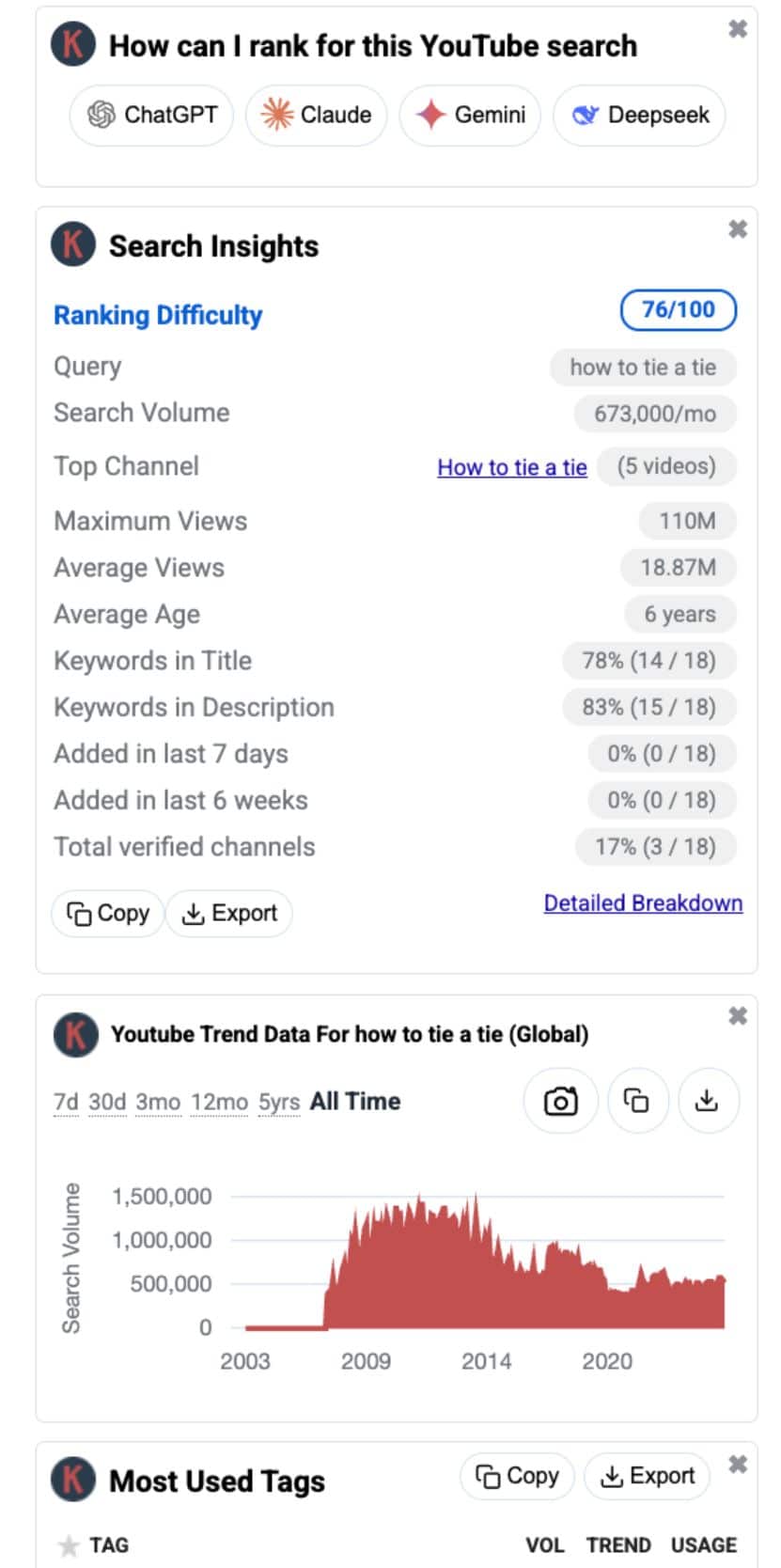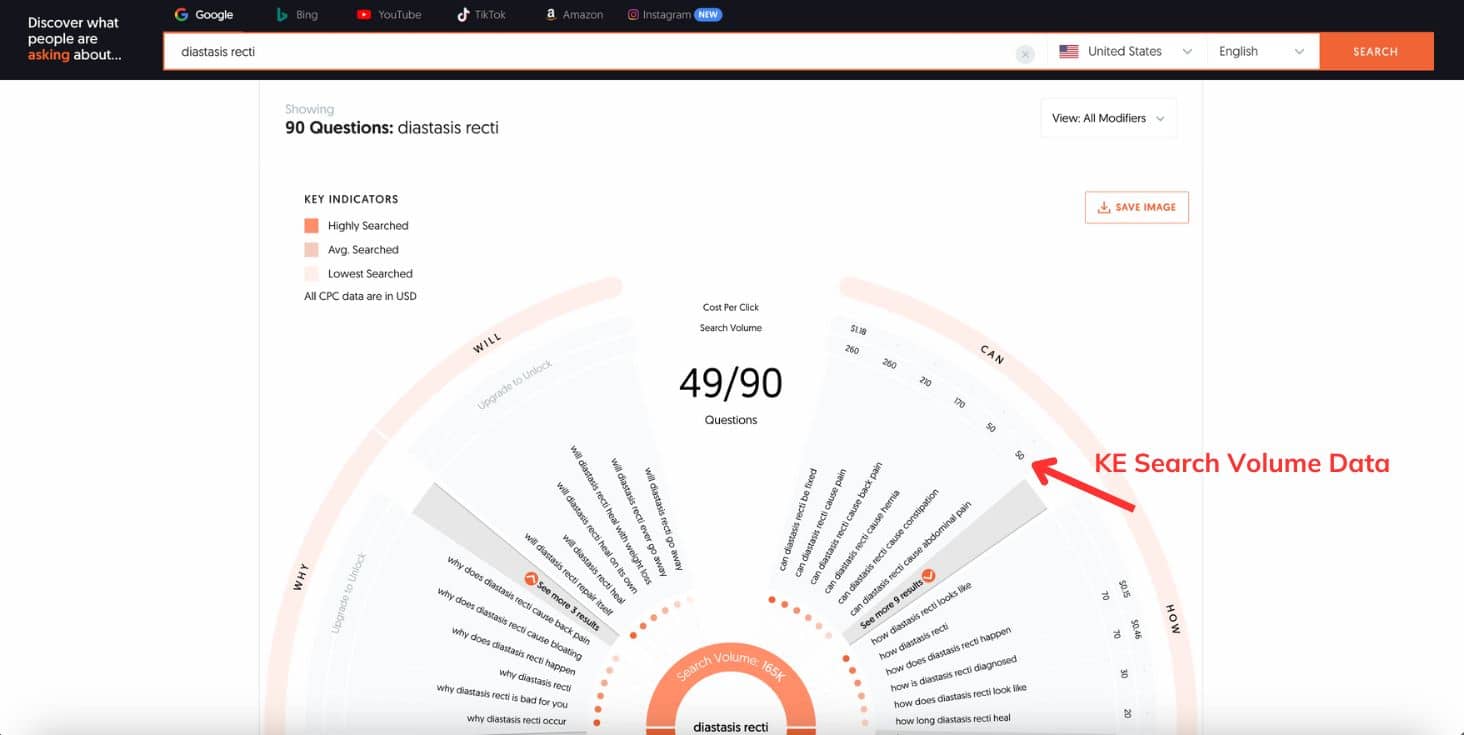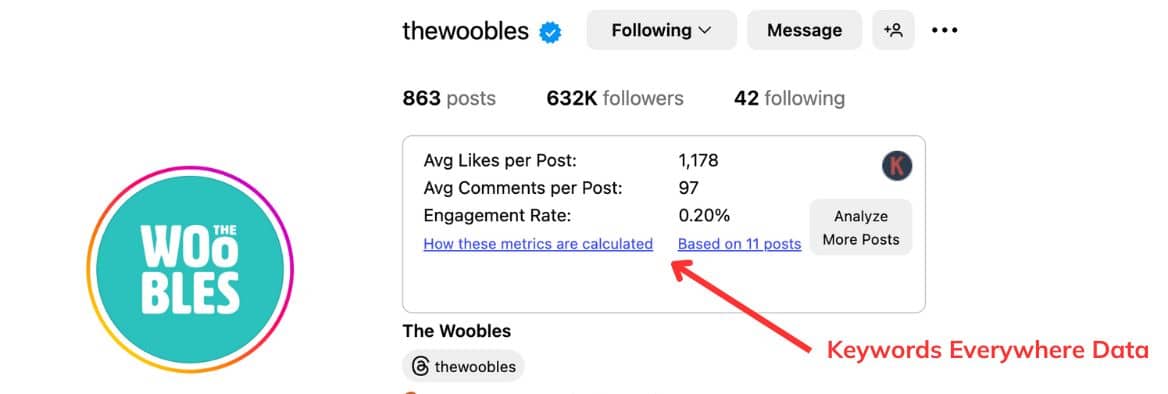
Draw More Right-Fit Clients To Your Website.
Subscribe to get your FREE Copy of the SEO SIMPLIFIED keyword research workbook.
Jump To:
Why Keywords Everywhere Is My Go-To SEO Tool (And Should Be Yours Too)
Keywords Everywhere is the keyword research tool I recommend the most, and not because I’m an affiliate or getting paid to say so. I use it, I love it, and I think it’s one of the most accessible SEO tools out there for solo service providers.
If the phrase “keyword research” makes your eyes glaze over, stay with me. This tool is simple. It’s not overloaded with dashboards or buried in SEO tech-speak. It gives you easy-to-understand data, right in your browser where you’re already searching.
What Is Keywords Everywhere?
Keywords Everywhere is a browser extension (available for Chrome and Firefox) that shows keyword data right in your search results. It pulls in monthly search volume, cost-per-click (CPC), and competition data every time you search on Google (and it works on other platforms too).
It’s dead simple to use, and it gives you:
- VOL = Search Volume: How many people are searching for this keyword each month. In general, terms with fewer searches are less competitive. But not always.
- CPC = Cost Per Click: How much advertisers are paying for clicks (a good proxy for how valuable a keyword is). In general, the higher the CPC the more competitive the term.
- CMP = Competition: A 0–1 score showing how many advertisers are bidding on this keyword (higher = more competitive)
These metrics help you assess whether a keyword is worth targeting in your content and whether you have a shot at ranking for it.
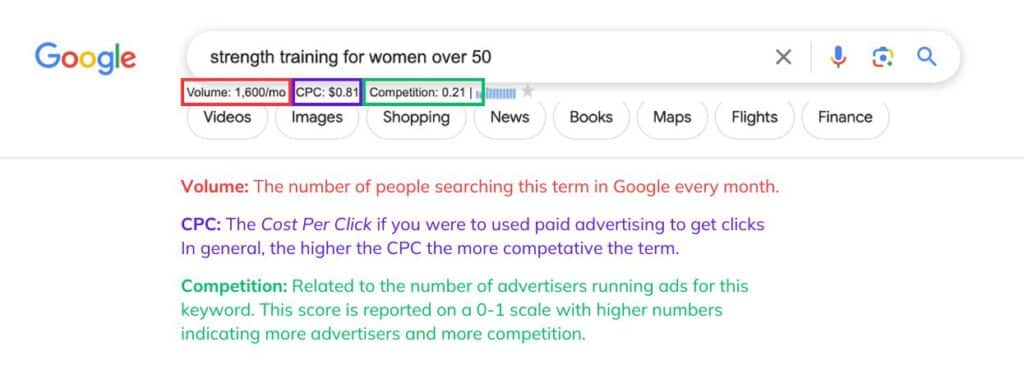
How to Download and Install Keywords Everywhere
- Go to keywordseverywhere.com
- Install the browser add-on for Chrome or Firefox
- Purchase a small credit pack ($10 gets you 100,000 keyword credits, enough for months of use)
- Enter your API key (they’ll email it to you)
- Start searching!
Once installed, you’ll see keyword data pop up automatically in Google, YouTube, Google Search Console, and more.
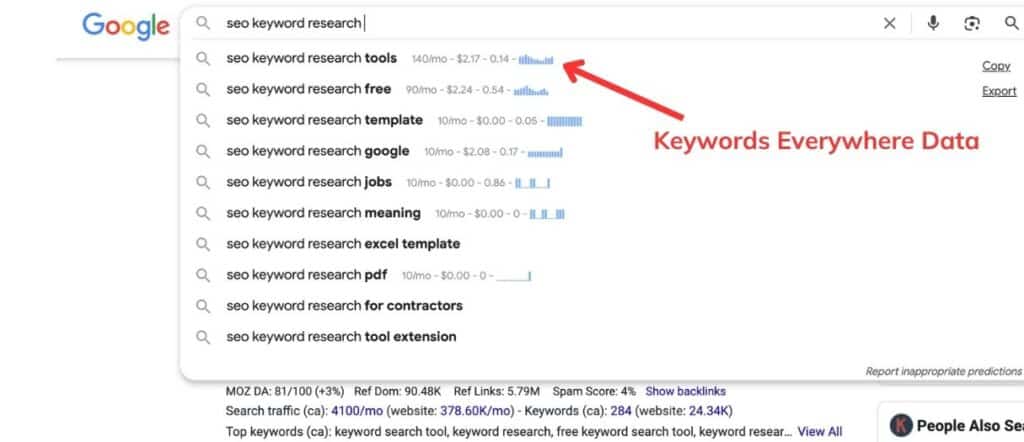
What Makes A Good Keyword?
- It aligns with your expertise and offers.
- People (your people) are actually searching for it.
- And you have a shot at ranking.
1. Relevance: Does it make sense for your business?
Start here. A keyword isn’t worth your time if it doesn’t connect to your services, content, or the problems you solve. If it wouldn’t attract the kind of person you want as a client, skip it.2. Demand: Are people looking for it?
Use Keywords Everywhere to check the search volume. You’re looking for signs of life. That might mean 10 monthly searches, or 250. Especially if you’re just starting out, low-volume doesn’t mean low value. Don’t write off “0 volume” keywords either. They often show up in hyper-specific searches and those are usually easier to rank for.3. Rankability: Can you compete?
This is where you weigh the keyword against your site’s current reality. If your site is new or isn’t pulling much organic traffic yet, aim for long-tail, low-volume, low-competition keywords. Look for search results (aka the SERP) where other solo businesses or blogs are ranking—not major media outlets or big-name brands. If your site has some traction, pull up Ubersuggest or Google Search Console. What keywords are you already ranking for? What’s their volume and difficulty? That’s your benchmark. Use that data to find your next set of realistic targets.ProTip: Zero-volume keywords (phrases that are indexed, but register very little traffic) are a great bet.
Zero-volume isn’t really zero volume. It’s just low volume. But also, low competition. You have a very good chance of ranking for these terms.
What Else Can Keywords Everywhere Do?
1. Insight into Your Competition
Under each search result, Keywords Everywhere shows you the Moz DA (Domain Authority) score for that website. Domain Authority (DA) is a metric concieved up by a company called Moz, which estimates how authoritative your website is in Google’s eyes. It’s evaluated on a scale of 1-100, where bigger numbers are more authoritative.- Higher numbers = more authority
- Ideally, you want to compete with sites that have a DA similar to or lower than yours
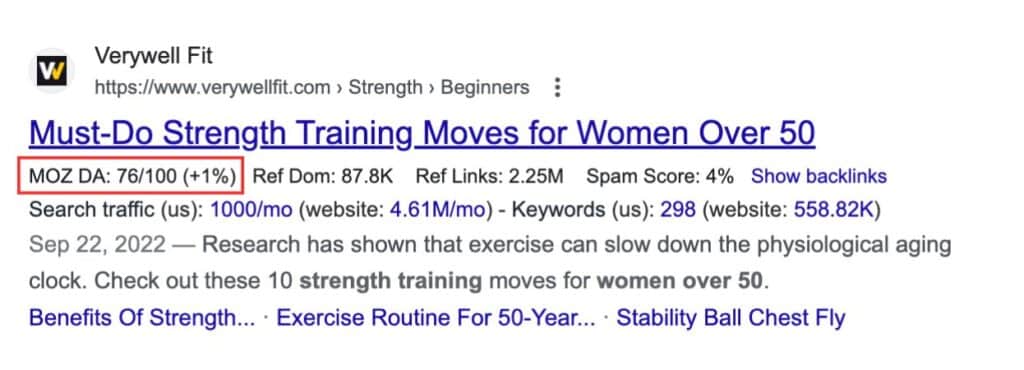
2. SEO Difficulty
Along a right-hand sidebar, you’ll also see an SEO Difficulty score, which estimates how hard it would be to rank for that keyword based on who’s currently ranking. While this number is calculated differently from the “Competition” metric, the two are related. Both help you gauge whether a keyword is realistic for your site. Target SEO difficulty less than 0.50 for easiest ranking.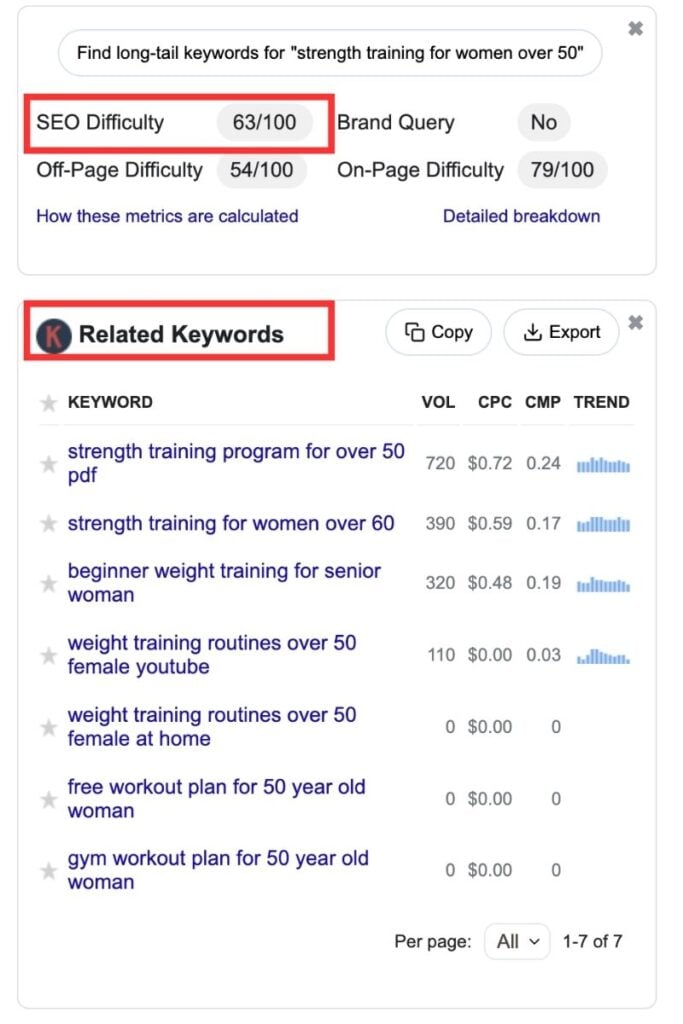
3. Related Keywords
Underneath the SEO difficulty score—in the Keywords Everywhere sidebar— you’ll also find related keywords and “People Also Search For” suggestions (see above). These lists are a convenient way to uncover adjacent topics and long-tail variations.Where Else Can You Use Keywords Everywhere?
- YouTube
Check out the sidebar:
- Other Search Engines: Bing and DuckDuckGo
- Google Search Console
- Answer the Public
- Even Instagram (although I find these data not so helpful)
My Personal Workflow With Keywords Everywhere
Here’s how I use it:
- I use my Keywords Everywhere-equipped Chrome browser to search Google for ideas I’m already curious about
- Check the metrics: If a phrase has “just the right amount” of search volume and competitiveness, I save it in a keyword research spreadsheet.
- Scope the SERPs (Search Engine Results Pages): As I narrow down my keyword list, I look at who’s ranking in the SERPs and their domain authority. I consider whether I’m competitive in this SERP.
- Scan the related searches in the right-hand side bar: Sometimes the related searches give me inspiration for a better keyword or a keyword for another piece of content.
- Adjust as needed: Sometimes I’ll add qualifiers or change phrasing to find easier-to-rank variations.
I mix high- and low-volume terms. Low-volume keywords help me rank faster. High-volume keywords help me add topical depth and serve my email list.
A Note on Cost and Value
Keywords Everywhere is not free, but it’s affordable. $10 covers over 100,000 searches, and most users (myself included) only need to top up once or twice a year. For the clarity it offers, that’s a no-brainer.
Final Thoughts: Use It as a Guide, Not a Gospel
No keyword tool is perfect. Use the data to guide your decisions, but always bring your own context and strategy to the table. Sometimes you write for search. Sometimes you write for subscribers. Keywords Everywhere just helps you do both a little smarter.
Want to use Keywords Everywhere to find strategic, low-competition keywords for your next blog post?
Join my email list for more smart, practical SEO tips designed for solo service providers. When you do, you’ll get my free SEO Simplified keyword research guide. It shows you how to choose high-value, realistic keywords that support your expertise and get your content in front of the right audience.


